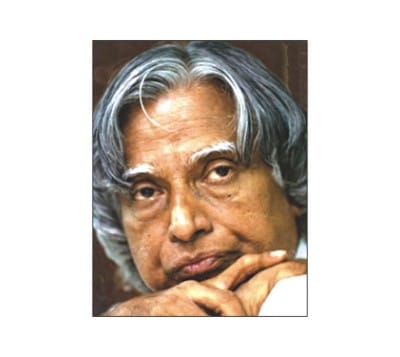Former Indian president Abdul Kalam due Sunday

Former Indian president Dr APJ Abdul Kalam will arrive in Dhaka on Sunday on a three-day visit.
According to an announcement by the Indian High Commission yesterday, Dr Kalam will meet President Zillur Rahman, Prime Minister Sheikh Hasina and Nobel Laureate Prof Muhammad Yunus during his stay here.
He will also visit the University of Dhaka, and Viqarunnisa Noon School and College.
Official sources said on his arrival in the capital in the afternoon, Abul Kalam would first visit Grameen Bank headquarters at Mirpur and meet Prof Muhammad Yunus.
Sheikh Hasina will host a dinner in honour of Dr Kalam, who was the 11th president of India from July 25, 2002 to July 25, 2007.
On Monday, the distinguished guest will visit Viqarunnisa Noon School and College in the morning, and interact with the students and faculty members there. He will be presented with a crest of the institution.
The former Indian president along with President Zillur Rahman will attend the first annual convocation of the University of Information Technology and Sciences at Bangladesh-China Friendship Conference Centre (BCFCC) at 12:30pm.
The eminent scientist will visit Dhaka University the same afternoon, deliver a special lecture at Nabab Nawab Ali Chowdhury Senate Bhaban on the campus at 4:00pm and exchange views with the students and faculty members. DU Vice Chancellor Prof AAMS Arefin Siddique would chair the session.
A crest of the university would be presented to Dr Kalam.
Born on October 15, 1931 at Rameswaram in Tamil Nadu, Dr APJ (Avul Pakir Jainulabdeen) Abdul Kalam specialised in Aeronautical Engineering from Madras Institute of Technology.
He made a significant contribution as project director to develop India's first indigenous Satellite Launch Vehicle (SLV-III), which successfully injected the Rohini satellite in the near earth orbit in July 1980 and made India an exclusive member of Space Club.
Dr Kalam was responsible for the evolution of ISRO's launch vehicle programme, particularly the PSLV configuration. After working for two decades in ISRO and mastering launch vehicle technologies, he took up the responsibility of developing indigenous guided missiles at Defence Research and Development Organisation as the Chief Executive of Integrated Guided Missile Development Programme.
He was responsible for the development and operationalisation of Agni and Prithvi missiles and for building indigenous capability in critical technologies through networking of multiple institutions. He was scientific adviser to the defence minister, and secretary, Department of Defence Research & Development from July 1992 to December 1999.
During this period, he led the weaponisation of strategic missile systems and the Pokhran-II nuclear tests in collaboration with the Department of Atomic Energy, which made India a nuclear weapon state. He also gave thrust to self-reliance in defence systems by progressing multiple development tasks and mission projects such as light combat aircraft.
As chairman of Technology Information, Forecasting and Assessment Council, the eminent scientist with the help of 500 experts led the country to arrive at Technology Vision 2020 and gave a road map for transforming India from the present developing status into a developed nation.
Dr Kalam served as principal scientific adviser to the government of India, with the rank of cabinet minister, from November 1999 to November 2001, and was responsible for evolving policies, strategies and missions for many development applications.
Four of Dr Kalam's books -- Wings of Fire, India 2020 - A Vision for the New Millennium, My Journey, and Ignited Minds - Unleashing the Power Within India-- have become household names in India and among the Indian nationals abroad.
Dr Kalam received honorary doctorates from 30 universities and institutions. He has been awarded the coveted civilian awards -- Padma Bhushan (1981) and Padma Vibhushan (1990), and the highest civilian award Bharat Ratna (1997).

 For all latest news, follow The Daily Star's Google News channel.
For all latest news, follow The Daily Star's Google News channel. 



Comments